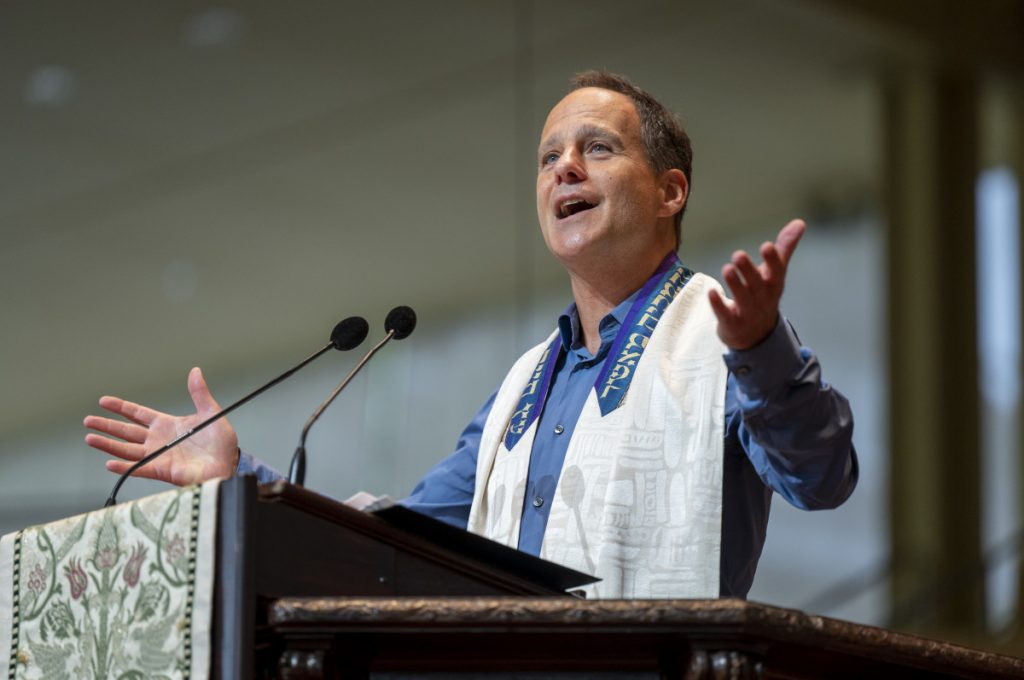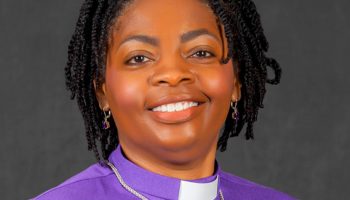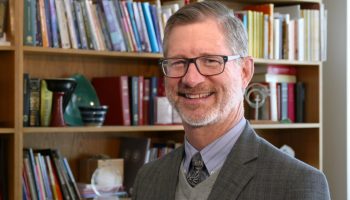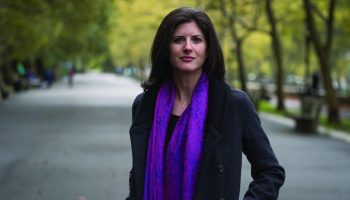MARY LEE TALBOT – STAFF WRITER

“I loved the moment when the Rev. John Morgan asked the congregation to pray with him,” said Rabbi Jonah Dov Pesner. “That is not part of my tradition. It shows the vulnerability of the pastor and that the preacher co-exists with the congregation. So will you pray with me? Because this one is a hard one.”
Pesner preached at the 9 a.m. Wednesday, July 14 morning worship service in the Amphitheater. His sermon title was “Pray for the Peace of Jerusalem: A Vision for a Land of Blessings and Shared Sanctity.” The scripture reading was Psalm 122: 6-9.
Toward the end of a reception for Pesner and his wife at the Everett Jewish Life Center, a man stood up and said, “May I ask one more question? Are Israelis and Palestinians neighbors or strangers?”
Pesner had told the congregation at worship on Monday that the Torah says to love your neighbor once and to love the stranger 36 times.
“In that one question was what has haunted me for decades,” Pesner said.
Several times his voice cracked and there were times tears dropped from his eyes as he talked about his experience of living in Jerusalem in 1995.
Pesner was studying at Hebrew University on Mount Scopus. In 1995, the state of Israel and the Palestinian Liberation Organization signed the Oslo Accord.
“It looked like the two-state solution was within reach,” Pesner said. “People were coming from all over the world to learn Hebrew.”
One morning Pesner missed his usual No. 26 bus. He waited for the next No. 26 bus and was lost in thought.
“I was shocked to consciousness by the sound of an explosion, sirens and a frenzy of shouting,” Pesner said. “I found someone and asked what had happened and she told me the No. 26 bus ahead of us had been exploded by a suicide bomber.”
Pesner spent the day visiting classmates in the hospital. One of his teachers was killed.
“I found myself, an American Jew, comforting my classmate Simona, a German Christian, who was a victim of Hamas,” he said.
That same year, Yitzhak Rabin, “his memory be for a blessing,” Pesner said, “a man committed to a secure peace and justice, was gunned down by an Israeli extremist. Our feelings went from hope to great fear.”
The text, Psalm 122: 6-9, Pesner told the congregation, challenges us to “pray for the wholeness and shalom of Jerusalem, for its sanctity and prosperity for the sake of its siblings. How can we maintain hope for a Jerusalem at peace when that peace is shattered by violence? I was angry, sad and afraid.”
Choices made by fear don’t go well, Pesner said, and to be a Jew is to have hope.
“How do we reconnect to the vision of Israel living in peace and equity?” he asked the congregation.
In order to find the vision for a way forward, Pesner has talked with and listened to a diverse cross-section of people.
“It is a sign of maturity to hold two conflicting truths at the same time,” he said.
The foundational narratives of the state of Israel and the Palestinian people are two competing truths, Pesner claimed, both full of truth.
“We are two people sharing one land and neither will leave,” he said. “Not now. Not ever.”
Since the time of Abraham, the children of Israel have dwelt in that land. There was always a remnant living there.
“Three times a day Jews pray for a return to Zion,” Pesner said.
Rabbi Abraham Joshua Heschel, in his book Israel: An Echo of Eternity, said that the bonds that tie Jews to Zion and Jerusalem remained wherever Jews have lived after the destruction of Jerusalem in A.D. 70.
Zionism should be a source of justice and safety for all God’s children. All of my preaching defines my Zionism. Just as I critique the United States as a citizen, so I demand of Israel to heed the warnings of the prophets and rebuke injustices.”
– RABBI JONAH DOV PESNER
Pesner recalled the words of Psalm 137:1-6: “By the rivers of Babylon— / there we sat down and there we wept / when we remembered Zion. / On the willows there / we hung up our harps. / For there our captors / asked us for songs, / and our tormentors asked for mirth, saying, / ‘Sing us one of the songs of Zion! / How could we sing the Lord’s song / in a foreign land? / If I forget you, O Jerusalem, / let my right hand wither! / Let my tongue cling to the roof of my mouth, / if I do not remember you, / if I do not set Jerusalem / above my highest joy.”
At Jewish weddings, the rabbi reads these words and then the couple shatters a glass and remembers Jerusalem.
“This reminds me of a powerful ritual of the Palestinians. They take out a key from a home that they were forced to leave after the birth of the state of Israel,” Pesner said. “There are millions who have stories about their connection to a house, a vineyard, the land.”
These narratives compete, he said.
“And whatever the truth about the past, we both have the right to live in a homeland, but if it is the same land, then the land must be shared,” he said. “Sharing requires compromise.”
Pesner said, “The tension between these two truths is used and misused by extremists on both sides. We cannot allow violence to prevail. We have turned neighbors into strangers and love into hate. Zionism does not preclude Palestinian nationalism and there is nothing in Palestinian nationalism that excludes Zionism.”
Two states living side by side in peace is the solution, Pesner believes.
“No one has been able to articulate any other achievable, realistic plan for both to live on the same land,” he said. “Neither annexation or one state will do.”
The goal is for sanctity over sovereignty, for Israel to be what it has been called to be — a light unto the nations, he said.
“What is the way we can use sovereignty to restore sanctity? The two-state solution is the only way to honor the claims of both peoples,” Pesner said.
In his personal articulation of Zionism, Pesner believes Zionism yearns for all people to live in safety and peace.
“This sentiment is rooted in our liturgy, despite expulsion and exile,” he said. “Zionism is a social justice movement. Zionism is more than just about Jerusalem but is embodied in the text to be a light unto the nations.”
He continued, “Zionism should be a source of justice and safety for all God’s children. All of my preaching defines my Zionism. Just as I critique the United States as a citizen, so I demand of Israel to heed the warnings of the prophets and rebuke injustices.”
To see humanity in all is to acknowledge the truth of the Palestinians, the Arabs, the Muslims, the Christians and the Jews, he said.
“This is the test of Zionism and Palestinian national claims,” Pesner said. “If we can do this, we can transform the stranger into a neighbor. We can leave behind fear, anger and hate and we can love again.”
The Rev. John Morgan presided. Esther Northman, vice president of the Hebrew Congregation of Chautauqua, read the Scripture. The organ prelude and postlude were “Versets on Urbs Jerusalem beata,” by Jean Titelouze, performed by Joshua Stafford, who holds the Jared Jacobsen Chair for the Organist and is director of sacred music. Members of the Motet Choir sang “O Pray for the Peace of Jerusalem,” music by John Goss, words from Psalm 122: 6-9. The Robert D. Campbell Memorial Chaplaincy provides support for this week’s services and chaplain.




